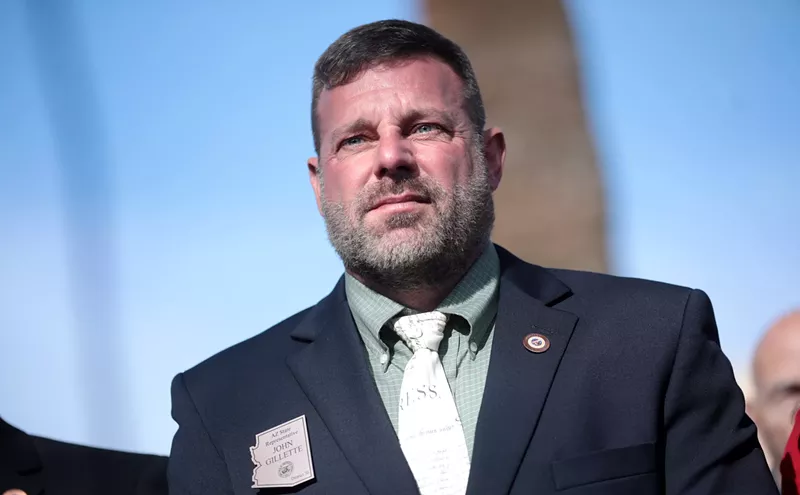But the unnecessary fear generated by the ruling and media is real — and so is the embarrassment Arizona is facing once again, thanks to poor perception of the state's legal system and the State Legislature.
In part, we have Andrew Thomas to thank. He's the former Maricopa County Attorney disbarred in 2012 for abusing his power. Now, people believe that Bill Montgomery (who replaced Thomas in 2010) or other Arizona county attorneys will start charging people for changing diapers."It is incredibly insulting to believe any prosecutor ... would not be able to tell the difference between an adult taking proper care of a child and the molestation of a child victim." — Bill Montgomery
tweet this
Headlines over the past few days have fueled the rumor:
New Child Sex-Abuse Law May Leave Parents Afraid to Even Change a Baby's Diaper in Arizona (Independent Journal Review)
In Arizona, Parents Could Go to Jail for Changing Their Kids' Diapers (Reason.com)
Changed a diaper? In Arizona, you could go to jail (Arizona Republic)
Bizarre law just made it illegal to change a baby's diaper (SheKnows.com)
There's even a British version:
Arizona court passes ruling equating changing a nappy with paedophilia (The Independent)
Contrary to two of the above articles, no new law has been passed.
The court, in a 3-2 ruling on September 13, simply upheld laws that have been in place since 1988 or before.
Basically, the court said prosecutors don't need to prove sexual intent in a child-sex-abuse or -molestation case. If a defendant wants to raise that defense, he or she must prove there was no sexual intent.
The problem arises, as the two dissenting judges in the case saw it, because the law defines the crime as sexual contact with someone under age 15, and then further defines sexual contact as "any direct or indirect touching, fondling or manipulating of any part of the genitals, anus or female breast by any part of the body or by any object or causing a person to engage in such contact."
Note that there's nothing in the definition about sexual intent. That was the gist of the dissenting argument by Justices Scott Bales and Robert Brutinel, who blamed the problem on a vaguely written law unique to Arizona.
"Parents and other caregivers who have changed an infant’s soiled diaper or bathed a toddler will be surprised to learn that they have committed a class 2 or 3 felony," they wrote.
But as the majority explains in the ruling, other laws also require a "lack of intent" defense to be proven by the defendant rather than the state. One example is the assault law, which says that a person commits assault in Arizona by knowingly touching a person in a way that produces injury or puts that person in imminent risk of being injured. That would include doctors in some cases, the justices point out. But doctors aren't charged with assault, and if they were, they could argue that they were just doing their job. As could diaper-changing parents.
The case at hand, Holle v. Arizona, isn't about a parent who changed a diaper. It's about Jerry Charles Holle, who was found guilty of sexually abusing an 11-year-old relative. She accused him of inappropriately kissing and touching her. He claimed the state had to prove he had sexual intent. The state court of appeals overturned the conviction, ruling that the "state must prove beyond a reasonable doubt that the defendant's conduct was motivated by a sexual interest."
But in its ruling, the state Supreme Court has put the onus back on the defendant.
The rumor that parents and caregivers will be charged for changing diapers goes beyond the scenario of an actual sexual predator using lack of intent to escape punishment. People are spreading the idea that Arizona prosecutors will literally charge and jail people for doing nothing other than changing a diaper.
No parent or caregiver in Arizona has ever been charged with a sex crime for changing diapers, nor have any doctors been charged for touching a child's genitals during a medical exam.
Montgomery says the public is being misled about the ruling's impact.
"It is incredibly insulting to believe any prosecutor reviewing a case for charging would not be able to tell the difference between an adult taking proper care of a child and the molestation of a child victim," he said on Tuesday in a written statement.
Reached on Wednesday, Montgomery elaborated, saying the dissenting justices used "rhetorical flourish that went too far."
As Montgomery points out, the title of the chapter of state law on child molestation includes sexual contact, sexual abuse, and child molestation.
"It's very clear from the titles — we're not talking about incidental conduct or conduct in the course of providing proper care for the child," he says.
Montgomery runs the largest prosecutor's office of the state's 15 counties and oversees thousands of felony cases each year. When weighing whether to charge a defendant with molesting a child, deputy county attorneys look specifically to find evidence of sexual misconduct, he says.
"In some cases, a young child might not understand the conduct," which necessitates a careful review of the facts, he says, adding that the office neither wants a person charged unfairly nor an offender to escape justice.
In theory, as the dissenting justices suggest in the ruling, a malicious prosecutor could manage to have someone — say, a political enemy — charged with child molestation based on evidence that he or she changed a diaper. Some of the recent articles on the subject reference the case of Montgomery's predecessor, Thomas. The former county attorney makes for a good example of prosecutorial villainy: Among his misdeeds, Thomas once charged a sitting judge with bribery based solely on a wild conspiracy theory. Asked at a news conference in 2009 to go over the evidence of the alleged bribery, Thomas gave the infamous answer: Arizona's bribery law is "very broad."
Yet Thomas is also an example of what can happen to a reckless prosecutor, given that he was later disbarred for his actions, including the inappropriate charging of the judge. Several checks and balances exist that would limit a prosecutor's ability to charge someone with child molestation when the only allegation is that the defendant changed a diaper.
One of the first is likely to be a grand jury, which would have to go along with the diaper-changing charge. But the improper charge probably wouldn't even get that far.
According to state law, all elected prosecutors must be lawyers, and lawyers must adhere to the state Supreme Court's Rules of Professional Conduct for Lawyers. As local ethics attorney Linda Shely points out, prosecutors — unlike other lawyers — have a special chapter governing their conduct, owing to their heavy responsibility.
"What a prosecutor has to have in order to proceed with a case is probable cause," Shely says. "If they didn't have probable cause, they couldn't charge somebody."
Probable cause in Arizona is based on the evidence in a case and — according to decades-old Arizona case law — must be judged by the "reasonable man" standard.
"[U]pon the appearances presented of the defendant, would a reasonably prudent man have instituted or continued the proceeding?" runs the classic guidance for prosecutors in a 1953 state Supreme Court case.
The prosecutor could be disciplined if a defendant proves that a charge was intended solely to harass, Shely adds.
After taking office in 2010, Montgomery made a couple of changes to restore credibility to the office in the post-Thomas era. Now, he says, the office's ethics committee has the power to order a review of a prosecutor's conduct and refer the findings to the state bar.
"I also gave the ethics committee authority to review complaints about my conduct/actions and refer to state bar without giving me any notice," he says.
Montgomery says he can't blame the media for this one.
"The language in the dissenting opinion is so inflammatory and conclusory, it made it really easy for someone to lift that sentence out, then declare this was the case in Arizona," he says.
Sure, the state deserves its reputation as the "meth lab of democracy," having passed controversial laws like the immigrant-targeting SB 1070 and a law that bans cities from banning plastic bags. But some of the recent diaper-changing stories take that cynicism toward Arizona too far.
The greater public's awareness of the issue began three days after the ruling, with a September 16 story by Matt Brown in the legal journalism site Mimesis.
"Prosecutors would never do something like that," blares the satirical headline. Brown then describes in colorful fashion how, in his opinion, they would do something precisely like that:
"There's a special sort of insanity about the relationship between Arizona's lawmakers and the courts. The lawmakers are crazy to start. They've proven over and over again that they're incapable of controlling themselves. They couldn't avoid hysteria and draft reasonable, limited laws when it comes to things that frighten them if their lives depended on it.
"As for what they passed regarding sex abuse and molestation, it seems they're either too stupid to realize what they've done or they're pretty sure prosecutors wouldn't target anyone who matters to them."
Concludes Brown: "The majority's opinion can really be summed up as 'just trust them.' Given the sad reality of how things work here, that's a terrifying proposition."
Slate.com writer Mark Joseph Stern wrote an article based on the Mimesis story the same day, but his story — the first mainstream piece on the ruling — went viral. Like Brown, Stern suggests that prosecutors will in fact begin charging parents for changing diapers:
"As to the risk that the law criminalizes typical parental tasks, the majority shrugs that 'prosecutors are unlikely to charge parents' engaged in innocent conduct," he wrote. "(This 'just trust the prosecutors' dodge doesn’t always work out so well in Arizona.)"
Those concerns can't be fully dismissed, especially in a county with a former county attorney who was disbarred, and a current sheriff who has targeted his political enemies with criminal investigations.
But the reality is that any prosecutor who charges a parent with molestation because of a changed diaper is likely to end up without a law license — like Thomas.












